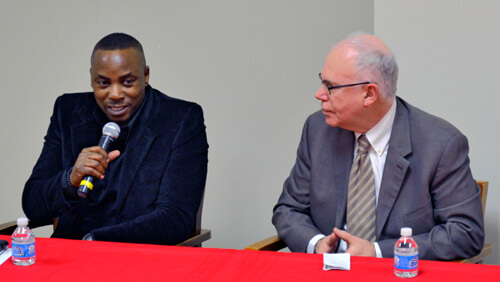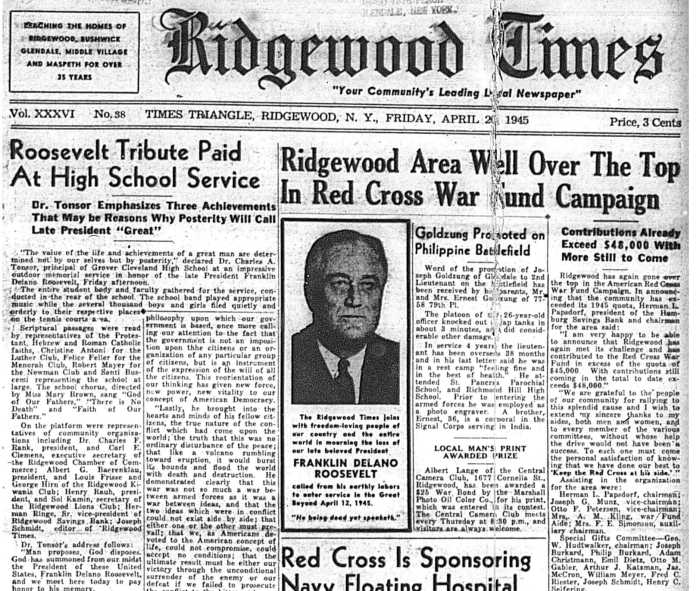The film, “David is Dying,” a provocative drama written and directed by Stephen Lloyd Jackson journeys through the life of a tortured soul that constantly engages in self-destruction and self-sabotage. David Brown’s need to be in control destroys his true love Clara and their relationship. In the end it’s not his HIV diagnosis that is killing him but the death of his soul. This film was part of the first installment of Dine-In Cinema Health Fest Series followed by a Q&A with the film director, Dr. Leonard Berkowitz, chief of infectious diseases at Brooklyn Hospital Center; Dierdre Wallace-Hinds, licensed social worker/ pharmacy specialist at the AIDS Healthcare Foundation and moderator HIV Activist Michelle Lopez.
The Dec. 2 program presented by caribBEING, Brooklyn Hospital Center and the AIDS Healthcare Foundation celebrated World AIDS Day and sought to have discourse about awareness, education and the prevention of HIV/AIDS.
“This event is a great opportunity for The Brooklyn Hospital Center moving forward to continue the dialogue regarding HIV/AIDS awareness,” says Leroy R. Charles, vice president of external affairs. According to the New York City Dept. of Health’s 2012 HIV Surveillance annual report, HIV diagnoses in New York City have decreased by 40 percent. However 3,141 New Yorkers were newly diagnosed with HIV and 20 percent already had AIDS when diagnosed.
Statistics from the report also show that Brooklyn has the highest percentage of new HIV cases compared to the five boroughs with 27 percent, followed by Manhattan (25.7 percent) and The Bronx (18.6 percent). Hopefully, showing films like “David is Dying” makes the issues surrounding HIV more digestible in combating the stigma associated with the disease.
Some people are still clinging to myths about HIV/AIDS and how it can be contracted.
“Individuals still want to lock themselves into this myth that if you touch someone, kiss someone, hug someone with HIV you’re going to contract it”, says Lopez.
Open dialogue about HIV/AIDS can be dificult to discuss in Caribbean communities, which is ironic, since the Caribbean ranks second to sub-Saharan Africa for HIV/AIDS infection rates.
“There is a tremendous amount of stigma related to HIV/AIDS awareness among Caribbean constituents,” Lopez adds. “I’m originally from Trinidad and I’m someone (who) has zero-tolerance towards it. As a woman living with HIV, I tend to put a face (to it) to help individuals understand this fear or this myth that you are walking around with people who are diagnosed with HIV. You could be in the same situation as I am,” said Lopez.
“When I got diagnosed, I was offered HIV testing because of a situation I was living [in]. I wasn’t someone out there as an active drug user and I wasn’t doing anything promiscuous. These are the labels that people tend to say: “Well I’m not promiscuous, I’m not using drugs, I’m not shooting up, so I’m good … so I don’t have to worry about HIV.”
David Is Dying is an excellent opportunity to stimulate dialogue in the community,” says Lopez. “There is common ground that you could sit and look at the movie and parts of it can reflect your life and people you know.”
Both Brooklyn Hospital Center and caribBeing want to continue the film series to open dialogue about various health related issues in the future.
“I wanted to look at the role healthy and thought-provoking programming can play in creating dialogue and a sense of urgency around chronic health problems such as HIV/AIDS. As a hospital, we must take an active role in health education, not only for humanitarian reasons, but because of the threat of disease in our community,” said Karen Jemmott, director of community affairs at The Brooklyn Hospital Center.
Hopefully, more Brooklyn residents will attend future Dine In HealthFest events.
“I would like to see more support from the community because the series is intended to be an exchange between health practioners and Brooklyn residents”, said Shelly Worrell, founder of caribBeing.

























